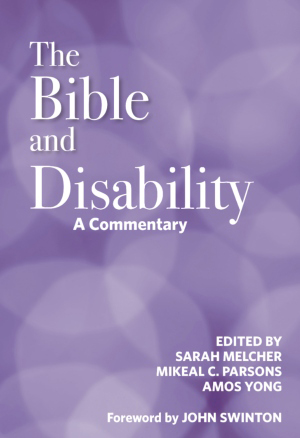
The Bible and Disability: A Commentary
Edited by Sarah Melcher, Mikeal C Parsons and Amos Young
Reviewed by Martin Hobgen
 This book is a very significant contribution to both the fields of Disability Studies and Biblical Studies. In the past there has been a tendency to focus on ‘difficult passages’ with regards to disability, such as the Levitical ‘ban’ on disabled priests (Leviticus 21, 22) or the many healing miracles recorded in the gospels. One of the greatest strengths of this book is that it provides a broad perspective on how disability features throughout the Bible. The whole bible is covered in twelve chapters, written by biblical scholars who are familiar with Disability Theology: Genesis & Exodus; Leviticus-Deuteronomy; Joshua-Second Kings; First and Second Chronicles-Esther; Job, Proverbs & Ecclesiastes; Psalms, Lamentations & Song of Songs; Isaiah, Jeremiah, Ezekiel, Daniel and the Twelve; Mark and Matthew; Luke-Acts; John, first-third John, Revelation; Paul; Hebrews and Catholic Letters.
This book is a very significant contribution to both the fields of Disability Studies and Biblical Studies. In the past there has been a tendency to focus on ‘difficult passages’ with regards to disability, such as the Levitical ‘ban’ on disabled priests (Leviticus 21, 22) or the many healing miracles recorded in the gospels. One of the greatest strengths of this book is that it provides a broad perspective on how disability features throughout the Bible. The whole bible is covered in twelve chapters, written by biblical scholars who are familiar with Disability Theology: Genesis & Exodus; Leviticus-Deuteronomy; Joshua-Second Kings; First and Second Chronicles-Esther; Job, Proverbs & Ecclesiastes; Psalms, Lamentations & Song of Songs; Isaiah, Jeremiah, Ezekiel, Daniel and the Twelve; Mark and Matthew; Luke-Acts; John, first-third John, Revelation; Paul; Hebrews and Catholic Letters.
The book is written from a US perspective and some of the scholars and the extensive references may be unfamiliar to UK readers. There are several brief discussions of sociological models of disability, which would have benefited from being addressed together in the introduction. In addition to this discussion of the ‘Social Model’ often assumes a US variant, the ‘Minority Group Model’ as used by Nancy Eiesland in her ground breaking The Disabled God (Eiesland, 1994). This is used rather than the Social Model that is widely used in the UK. ((Oliver, 1990) critiqued by (Shakespeare, 2013)) The ‘Cultural Model’ referred to several times is closest to the ‘critical realist’ approach taken by Oliver and others in the UK (Shakespeare, 2013). The approach taken by the different authors varies and this is both a strength and weakness, providing different perspectives but making straightforward comparisons difficult at times. There is an assumption that the reader is familiar with the issues raised by Disability Theology and the wider context of Disability Studies. (This is a wide-ranging interdisciplinary approach to understanding disability that has been developed in the last 15 or so years in the UK and US.)
The authors are not afraid to acknowledge when the Bible presents problematic material but rather than accept these at face value they seek to determine if there are deeper influences shaping these. By doing this they expose and utilise aspects of the Bible which challenge some preconceptions of disability. One important theme is to point out that some concerns of the OT, such as infertility, were socially very disabling in contrast to the contemporary situation where IVF and related treatments, together with adoption, have all but removed the social stigma for many people. There has been a similar transformation in the attitude towards people with a range of skin diseases, often labelled leprosy, which are not treatable and no longer a reason to exclude people from the community.
The picture of disability that emerges is complex and it is clear that there are no easy ways to encapsulate a biblical approach to the subject. This book challenges the common tendency to read our understanding of disability back into the text and provides resources to gain a better perspective of the context in which the various parts of the Bible were first written. This enables disability to be understood as part of the rich diversity of humanity made by and in the image of God.
Nancy Eiesland’s image of the disabled God focuses the resurrected Jesus still bearing the marks of crucifixion, the marks of impairment, which he brings into the God-head. Some of the writers in this volume extend the concept of Jesus as the disabled God into his ministry through the identification of the attitudes towards him that counted him as an outsider along with disabled people of his day.
To my mind one of the aspects of this book that has the broadest application are the various discussions of the metaphoric language that both reveals and shapes how we understand disability and relate to disabled people. The way we use metaphors of sight, hearing, walking etc. can have a profound impact on how disabled people are included or excluded from church communities.
This book provides a rich and diverse perspective on disability that will enable a nuanced approach to disability and disabled people to be developed. It serves as a good companion the previously published Disability in the Christian Tradition. (Brock & Swinton, 2012)
This article was first published in Regent’s Reviews (April 2019)
Details:
Editors: Melcher, S J, Parsons, M C, & Yong, A
Title: The Bible and disability: A commentary
Publisher: Baylor University Press, (2017)
Bibliography
Brock, B, & Swinton, J (2012).
Disability in the Christian tradition: a reader. Grand Rapids, Mich: William B Eerdmans Pub Co.
Eiesland, N L (1994).
The Disabled God : Towards a Liberatory Theology of Disability. Nashville: Abingdon.
Melcher, S J, Parsons, M C, & Yong, A (2017).
The Bible and disability: A commentary: Baylor University Press.
Oliver, M (1990).
The politics of disablement. London: Macmillan.
Shakespeare, T (2013).
Disability rights and wrongs revisited: Routledge.